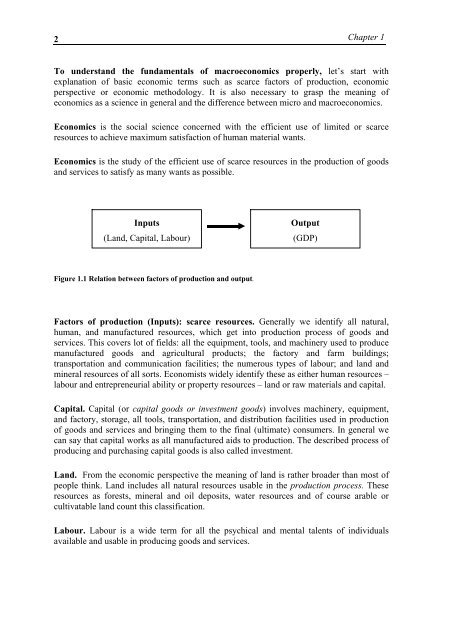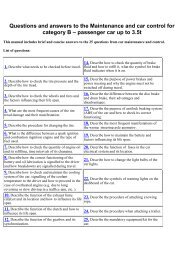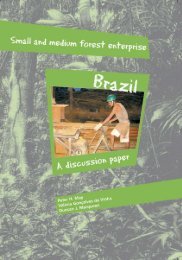MacroeconomicsI_working_version (1)
You also want an ePaper? Increase the reach of your titles
YUMPU automatically turns print PDFs into web optimized ePapers that Google loves.
2<br />
Chapter 1<br />
To understand the fundamentals of macroeconomics properly, let’s start with<br />
explanation of basic economic terms such as scarce factors of production, economic<br />
perspective or economic methodology. It is also necessary to grasp the meaning of<br />
economics as a science in general and the difference between micro and macroeconomics.<br />
Economics is the social science concerned with the efficient use of limited or scarce<br />
resources to achieve maximum satisfaction of human material wants.<br />
Economics is the study of the efficient use of scarce resources in the production of goods<br />
and services to satisfy as many wants as possible.<br />
Inputs<br />
(Land, Capital, Labour)<br />
Output<br />
(GDP)<br />
Figure 1.1 Relation between factors of production and output.<br />
Factors of production (Inputs): scarce resources. Generally we identify all natural,<br />
human, and manufactured resources, which get into production process of goods and<br />
services. This covers lot of fields: all the equipment, tools, and machinery used to produce<br />
manufactured goods and agricultural products; the factory and farm buildings;<br />
transportation and communication facilities; the numerous types of labour; and land and<br />
mineral resources of all sorts. Economists widely identify these as either human resources –<br />
labour and entrepreneurial ability or property resources – land or raw materials and capital.<br />
Capital. Capital (or capital goods or investment goods) involves machinery, equipment,<br />
and factory, storage, all tools, transportation, and distribution facilities used in production<br />
of goods and services and bringing them to the final (ultimate) consumers. In general we<br />
can say that capital works as all manufactured aids to production. The described process of<br />
producing and purchasing capital goods is also called investment.<br />
Land. From the economic perspective the meaning of land is rather broader than most of<br />
people think. Land includes all natural resources usable in the production process. These<br />
resources as forests, mineral and oil deposits, water resources and of course arable or<br />
cultivatable land count this classification.<br />
Labour. Labour is a wide term for all the psychical and mental talents of individuals<br />
available and usable in producing goods and services.




